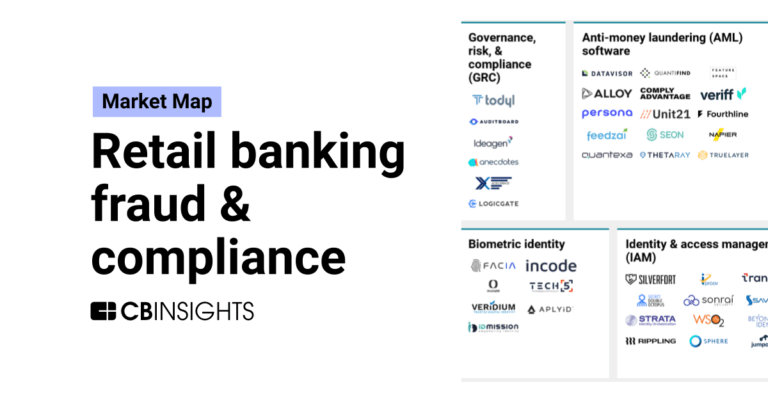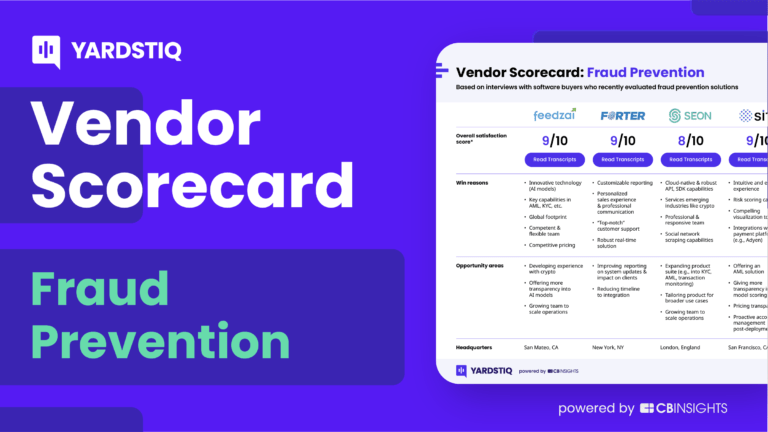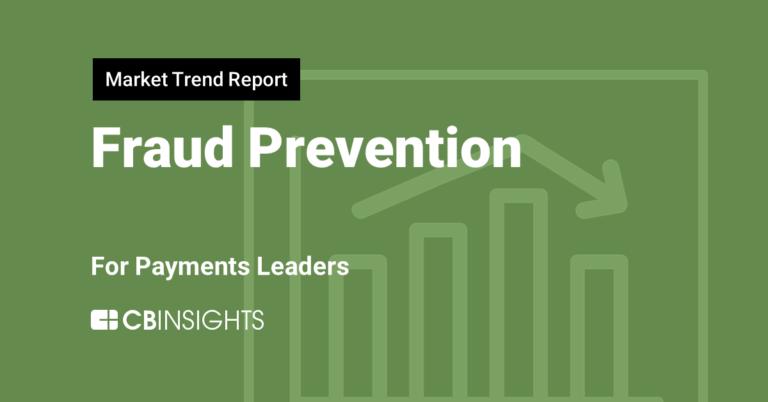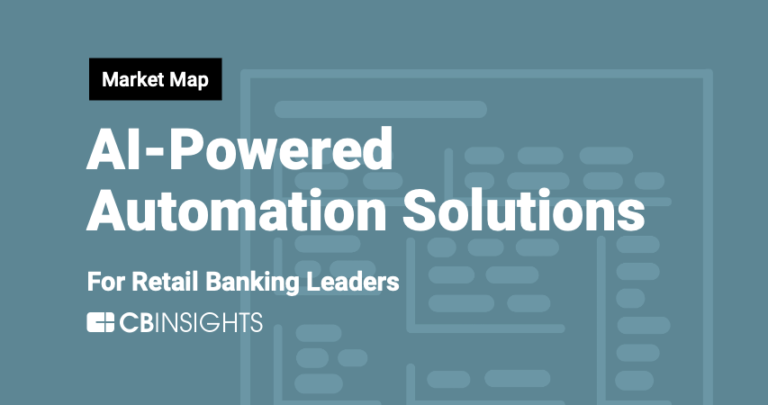
Feedzai
Founded Year
2011Stage
Unattributed VC | AliveTotal Raised
$280.8MMosaic Score The Mosaic Score is an algorithm that measures the overall financial health and market potential of private companies.
-10 points in the past 30 days
About Feedzai
Feedzai focuses on financial crime prevention, operating within the financial technology and artificial intelligence (AI) sectors. The company offers a suite of solutions that use advanced machine learning to detect and prevent financial fraud, manage financial risk, and ensure compliance with regulatory requirements. Its primary customers are large financial organizations, including retail and corporate banks, fintech companies, and payment service providers. It was founded in 2011 and is based in San Mateo, California.
Loading...
ESPs containing Feedzai
The ESP matrix leverages data and analyst insight to identify and rank leading companies in a given technology landscape.
The anti-money laundering (AML) software market helps detect, prevent, and mitigate the risks associated with money laundering and financial crimes. Solutions in this market analyze large volumes of data and identify suspicious activity for further investigation. This allows financial institutions and other regulated entities to monitor transactions, screen customers and counterparties, and conduc…
Feedzai named as Outperformer among 15 other companies, including NICE, Onfido, and ThetaRay.
Loading...
Research containing Feedzai
Get data-driven expert analysis from the CB Insights Intelligence Unit.
CB Insights Intelligence Analysts have mentioned Feedzai in 6 CB Insights research briefs, most recently on Mar 14, 2024.

Mar 14, 2024
The retail banking fraud & compliance market map
Dec 14, 2023
Cross-border payments market map
Feb 27, 2023 report
Top fraud prevention companies — and why customers chose themExpert Collections containing Feedzai
Expert Collections are analyst-curated lists that highlight the companies you need to know in the most important technology spaces.
Feedzai is included in 11 Expert Collections, including Unicorns- Billion Dollar Startups.
Unicorns- Billion Dollar Startups
1,249 items
Regtech
1,721 items
Technology that addresses regulatory challenges and facilitates the delivery of compliance requirements. Regulatory technology helps companies and regulators address challenges ranging from compliance (e.g. AML/KYC) automation and improved risk management.
Digital Lending
2,374 items
This collection contains companies that provide alternative means for obtaining a loan for personal or business use and companies that provide software to lenders for the application, underwriting, funding or loan collection process.
Payments
3,034 items
Companies in this collection provide technology that enables consumers and businesses to pay, collect, automate, and settle transfers of currency, both online and at the physical point-of-sale.
Cybersecurity
10,000 items
These companies protect organizations from digital threats.
Fintech
9,304 items
Companies and startups in this collection provide technology to streamline, improve, and transform financial services, products, and operations for individuals and businesses.
Feedzai Patents
Feedzai has filed 39 patents.
The 3 most popular patent topics include:
- machine learning
- data management
- artificial intelligence

Application Date | Grant Date | Title | Related Topics | Status |
|---|---|---|---|---|
7/27/2021 | 6/25/2024 | Data management, Transaction processing, Metadata, Database management systems, Diagrams | Grant |
Application Date | 7/27/2021 |
|---|---|
Grant Date | 6/25/2024 |
Title | |
Related Topics | Data management, Transaction processing, Metadata, Database management systems, Diagrams |
Status | Grant |
Latest Feedzai News
Oct 16, 2024
Navigating New Finance Threats Demands Holistic Real-time Approach Emerging threats, coupled with the increasing complexity of financial systems, demand a radical shift in detecting fraud. What’s needed is a holistic, real-time approach to combat these threats and protect customers. Rapid technological advancements are transforming the financial world, accelerating processes like never before. Yet, this progress comes with an escalating wave of sophisticated fraud schemes. These emerging threats, coupled with the increasing complexity of financial systems, demand a radical shift in our approach to detecting fraud. Traditional methods cannot provide the real-time, comprehensive insights needed to protect consumers while delivering the premium experiences they expect. RTInsights sat down with Anusha Parisutham, Senior Director of Platform and AI at Feedzai, to discuss the industry’s pressing issues. Long before these threats became headline news, Feedzai was already deep into researching the technology that could now hold the key to safeguarding customers and assets in a rapidly changing landscape. The interview has been lightly edited for clarity. RTInsights: What are the main fraud and financial crime challenges businesses face today? Parisutham: I’d break this down into two main areas. First, the fraud landscape itself is becoming increasingly sophisticated. We’re seeing a global increase in scams, and criminals are more creative in the methods they use to exploit both individuals and businesses. They’re finding new ways to steal credentials and authorize payments or transfers. Whether it’s third-party or first-party fraud, the threats are constantly evolving. The second challenge is how businesses respond. To stay ahead, companies and financial institutions must continuously invest in technology and detection solutions. But there’s a fine balance—they need to implement these measures without creating too much friction for the customer. Sometimes, stronger fraud prevention can disrupt the customer experience, which can affect customer loyalty and retention. Finding that balance between effective security and a smooth customer experience is critical. RTInsights: Given the need for real-time methods to battle fraud and financial crime, why have traditional approaches failed? Parisutham: One of the main reasons is tied to a macroeconomic trend we’re seeing: there’s simply more digital activity now. Post-COVID, financial activity online has surged, and we’re also dealing with a generation of consumers who are more digitally savvy. This shift has had a significant impact on the financial and fraud landscapes. With this increase in digital activity comes a massive explosion of data. Traditional solutions weren’t designed to handle this scale—they can’t process the vast amounts of data at the speed needed today. The fraud landscape demands real-time decision-making and the ability to process these huge data volumes instantly, which traditional systems just weren’t built to handle. One traditional approach, for example, is batch processing, where transactions are collected and processed in groups at scheduled intervals. But batch processing can’t keep up with how quickly transactions happen today—money moves in and out almost instantly. Another challenge is the siloed nature of traditional methods. Transactions can happen across so many different channels—such as mobile apps, online banking, card networks, in-person transactions, and even social media platforms. Because of this diversity, a siloed approach by business line simply isn’t effective anymore. To effectively combat fraud today, we need systems that not only process large amounts of data in real time but also provide a holistic view of what’s happening. Are customers logging into a mobile app? Are they on the web? Are they making transfers? Is money moving to a new beneficiary within minutes? Traditional systems weren’t built for this kind of comprehensive, account-level view of both transactional and non-transactional activities. RTInsights: Given that, what technologies, such as streaming engines, are needed? And what is Railgun? Parisutham: In today’s fraud landscape, we definitely need cloud-native technologies that can handle large volumes of data and sudden bursts of activity. These technologies give us the ability to scale both horizontally and vertically as needed. Real-time processing is also critical—whether it’s streaming data or profiling transactional and non-transactional activities in real-time, this capability is key. On top of that, AI and machine learning models are essential because they can evolve with new fraud patterns, unlike traditional rules-based systems. The landscape is constantly changing, and we need systems that can adapt just as quickly. Another important piece is end-to-end automation. As our decision systems get more sophisticated, by combining rules with AI-based approaches, automation helps fraud analysts and operations teams respond faster and more efficiently. Anywhere we can simplify and automate fraud detection and response is a win. So, what is Railgun? Railgun is our latest innovation designed to address these shifts in the fraud landscape and the growing trends in digital activity. It’s a patented, real-time streaming engine that can handle massive amounts of data in real time. Not only that, but it can compute long-term profiles over extended periods, giving us a clear and accurate picture of both transactional activities—like purchases and transfers—and non-transactional activities such as login attempts, device and location data, etc. This comprehensive insight is delivered at high speed and with low latency. Railgun is also a cloud-native, distributed system, which means it’s built to scale reliably and efficiently, even with large volumes of data. RTInsights: What’s the benefit of using Railgun? What do you achieve, and what do your users get out of this? Parisutham: One of the key pillars of Feedzai’s risk solution is human-centered AI, which allows us to use highly granular profiling in both our machine learning models and rules-based decision-making. By granular profiles, I mean being able to identify what’s normal and what’s abnormal for a specific customer or transaction. For example, how much does a customer typically spend in a week, a month, or six months? How much money usually flows in and out, how fast money moves, are payments made to known beneficiaries, and how many transactions are typical for an account during a given period? We want these profiles to be detailed, and we want a good history of them available in real time so that we can accurately detect abnormalities. One of the primary benefits of Railgun is that it enables us to calculate these granular metrics over extended periods of time, all in real time. Some of the largest financial institutions want to create profiles that span 12 to 18 months. These are massive data sets, and Railgun allows them to calculate these real-time profiles without relying on batch jobs or making approximations. The richness, granularity, and long-term profiling Railgun provides is a significant advantage. Another key benefit of Railgun is its ability to speed up the process of updating risk strategies. If a new fraud pattern emerges and a new rule or profile needs to be added, Railgun’s speed allows customers to implement and deploy those changes much faster than they could with older systems. Additionally, traditional fraud detection systems tend to operate in silos—credit operations are separate from debit operations, for example. They don’t have a holistic view of how money moves across all business lines. One of Railgun’s key benefits is that it enables what we call omnichannel profiling, meaning it can track and profile activity across different channels or business lines to give a comprehensive view of a customer’s behavior. From a market perspective, this is crucial, especially with the liability shift we’re seeing in regions like the UK, where banks are now required to share the liability for scams. It’s no longer enough to just monitor outbound transactions; banks need to look at inbound money movements as well and view the entire flow holistically. Railgun helps detect fraud across all channels in real time by providing this level of visibility, which traditional approaches can’t do because of the siloed and offline batch nature of their systems. Tagged
Feedzai Frequently Asked Questions (FAQ)
When was Feedzai founded?
Feedzai was founded in 2011.
Where is Feedzai's headquarters?
Feedzai's headquarters is located at 400 Concar Drive, San Mateo.
What is Feedzai's latest funding round?
Feedzai's latest funding round is Unattributed VC.
How much did Feedzai raise?
Feedzai raised a total of $280.8M.
Who are the investors of Feedzai?
Investors of Feedzai include GED Conexo Ventures, Sapphire Ventures, Citi Ventures, KKR, Oak HC/FT Partners and 7 more.
Who are Feedzai's competitors?
Competitors of Feedzai include Effectiv, NetGuardians, BioCatch, Accertify, ComplyAdvantage and 7 more.
Loading...
Compare Feedzai to Competitors

Resistant AI deals with automated financial risk and compliance systems. It offers products such as document forensics, which authenticates documents with artificial intelligence (AI) to detect fraud, and transactions forensics, which helps simplify fraud detection, algebraic modeling language (AML), and scoring system. Resistant AI was formerly known as Bulletproof AI. The company was founded in 2019 and is based in Prague, Czech Republic.

Sift provides real-time machine learning fraud prevention solutions for online businesses. Its machine-learning software automatically learns and detects fraudulent behavioral patterns and alerts businesses before they or their customers are defrauded. It provides its services in a wide range of industries such as financial technology, retail, payment service providers, and more. It was formerly known as Sift Science. It was founded in 2011 and is based in San Francisco, California.

Shield is a device-first risk AI platform specializing in fraud prevention and risk intelligence within the digital business sector. The company offers solutions to identify and eliminate fraudulent activities through global standard device identification and actionable risk intelligence. Shield primarily serves industries such as ride-hailing, social media, e-commerce, digital banking, and gaming. Shield was formerly known as CashShield. It was founded in 2008 and is based in Singapore, Singapore.

Ravelin specializes in fraud prevention and payment security within the online business sector. The company offers a suite of solutions that utilize machine learning and human insights aiming to protect against online payment fraud, account takeovers, policy abuse, marketplace fraud, and optimization of three-dimensional secure transactions. Ravelin primarily serves online merchants looking to secure their transactions and enhance customer journey. It was founded in 2014 and is based in London, United Kingdom.

ComplyAdvantage operates as a financial crime risk data and detection platform using artificial intelligence (AI). It offers a database of people and companies to help organizations identify risk events from structured and unstructured data points. It serves banks, insurance, payments, cryptocurrency, and more sectors. ComplyAdvantage was formerly known as Mimiro. The company was founded in 2014 and is based in London, United Kingdom.

Fraud.net specializes in AI-powered fraud detection and prevention for various industries, including financial services and e-commerce. The company offers a suite of services that include real-time transaction monitoring, identity verification, and anti-money laundering (AML) compliance. Fraud.net's solutions cater to sectors such as financial services, e-commerce, travel, and government. It was founded in 2015 and is based in New York, New York.
Loading...


